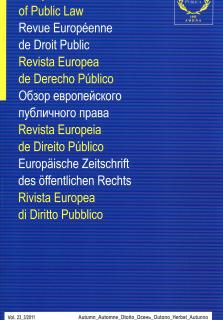
Administrative Law / Droit administratif
2011
Portugal
Carlos Vaz de Almeida
On May 17, 2011, Portugal contracted a € 78.000.000.000,00 loan with the International Monetary Fund, the European Central Bank and the European Commission. Within the financial assistance framework, the parties entered into a Memorandum of Understanding on Specific Economic Policy Conditionality to be executed from 2011 to 2013. Further to the said Memorandum, several economic and administrative measures that have to be implemented as conditions precedent to the disbursements have since been enacted. Notably, the Portuguese Government and Parliament have passed legal statutes leading to the phase-out of the State from publicly quoted companies and to the liberalization of the electricity and gas markets. Most importantly, a reform of the Court of Auditors Law which exponentially increases its controlling powers over the public expenditure has also been enacted. As a result of the Memorandum of Understanding, Portugal is experiencing a deep legal reform with results yet to be verified.
Le 17 mai 2011, le Portugal a contracté un emprunt de 78 milliards d’euros auprès du Fonds monétaire international, de la Banque centrale européenne et de la Commission européenne. Dans le cadre de l’assistance financière, les parties ont signé un Protocole d’accord concernant une politique économique spécifique conditionnelle, à mettre en œuvre de 2011 à 2013. Suite au dit Protocole, certaines mesures économiques et administratives qui doivent être appliquées comme conditions aux versements ont depuis été votées. En particulier, le gouvernement et le parlement portugais ont adopté des instruments juridiques visant à faire sortir progressivement l’Etat des sociétés publiques cotées en bourse et à libéraliser les marchés du gaz et de l’électricité. Mais surtout, une réforme de la loi relative à la Cour des comptes, qui accroît considérablement ses pouvoirs de contrôle des dépenses publiques, a également été adoptée. En conséquence du Protocole d’accord, le Portugal connaît une profonde réforme juridique dont les résultats sont encore à vérifier.





















